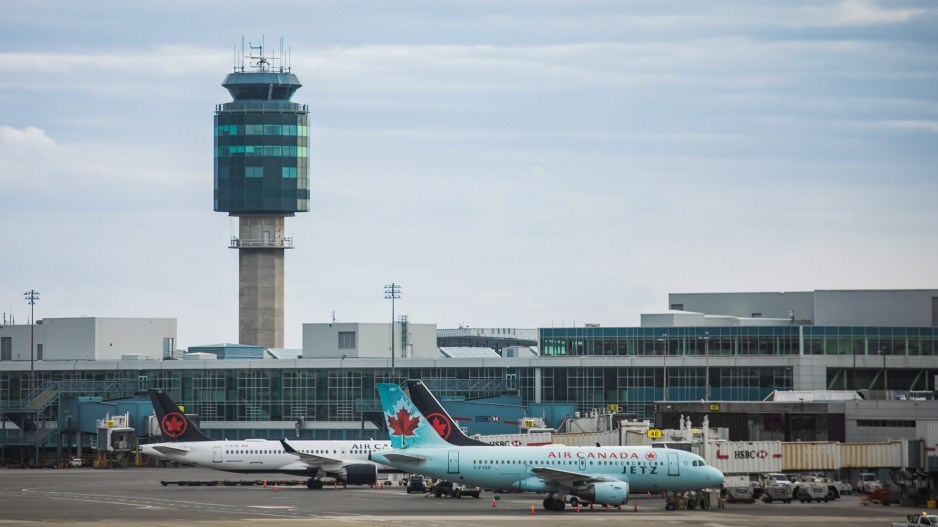The British Columbia government’s new regulations that mandate producers of jet fuel to include sustainable aviation fuel in their available supply are two things. It is a progressive step in the energy transition towards a greener future, and it is also likely going to make air travel, especially in Western Canada, even more prohibitively expensive for middle-class travellers.
Like everything else affected by the cost-of-living crisis, inflationary effects will almost always be borne by the consumer.
The costs of food, monthly rents and other most basic and essential necessities have increased dramatically since 2019. Costs for the average basket of groceries in Canada has surged by roughly 40 per cent in the past three years, while nominal wages are expected to grow by less than three per cent in 2024, and real wages are 2.4 per cent lower than the pre-pandemic year of 2019.
Renting an apartment in cities like Vancouver has jumped from $706 between 2019 and 2024. British Columbians are financially stressed, with one survey finding that one in three British Columbians are considering leaving the province due to the cost of living. Small towns in B.C. have seen an influx of young residents leaving the commercial centre of Vancouver.
For those who need to travel faster than a car, airlines are their lifeline for getting around from places like Fort St. John or Prince George to Vancouver or Calgary. Unfortunately, smaller and often more affordable carriers have a long history of short lifespans and commercial failure.
Last winter, Lynx Air suddenly went under and had to close due to rising operating costs. High fuel and regulatory costs, and punishing competition from the established, high-profile carriers in Canada’s protected airline market have pushed others to the brink.
Sustainable aviation fuel (SAF) is good for the environment, but like most greener options, it is prohibitively more expensive than conventional jet fuel. In 2022, SAF in the United States traded for an average of $2,400 per ton, which is 250 per cent pricier than the conventional jet fuel airlines rely upon. By last June, SAF was trading at $2,700 per ton.
For the smaller, more affordable airlines operating on razor-thin margins, being essentially forced to purchase this vastly more expensive fuel could be crippling, or even a death sentence.
B.C.’s new regulations for jet fuel supply require producers to incorporate escalating percentages of SAF into what they sell, starting with a one-per-cent inclusion rate in 2028, before rising to three per cent in 2030. Furthermore, fuel producers must reduce carbon intensity at a rate of 10 per cent by 2030.
Inevitably, the costs thrust upon the airlines will be passed on to consumers through higher ticket prices.
This has occurred with almost every other product provided by the private sector since 2019, and there is no good reason to expect airline tickets to be any different. For passengers, especially those in the middle class who have freshly relocated to smaller, more remote towns off the B.C. coast, this additional expense will make air travel more unaffordable.
As most people are probably aware, the cost of air travel has already painfully jumped by a quarter compared to 2019, with flights from Vancouver to Edmonton coming in at $737 during the peak tourism season. For context, you can fly from Vancouver to London, England for about $1,000.
The promotion of sustainable aviation fuels parallels the push for consumers to switch to electric vehicles. Incentivized by the government, EVs still remain a more expensive option than their traditional gas-powered counterparts.
Unlike eastern provinces like Ontario and Quebec, Western Canada does not have an extensive rail network with frequent connections between major population centres. Part of this is a matter of geography, but planes are ultimately the quickest and most convenient way to travel from northern B.C. towns to Vancouver or Victoria.
For a flight from Prince George to Vancouver on September 5, the only options are WestJet or Air Canada, which are well established and leave little room for up-and-coming competitors. Adding the cost for SAF will make it even more difficult for airline startups to break into the already-tough market.
Canadians everywhere, not just in B.C., have suffered from the lack of peculiarities of Canada’s airline industry. The federal government’s protectionist policies for the airline industry have narrowed consumer options to a very short list, leading to some of the highest domestic airfares in the world.
Mandating that producers only include three per cent SAF in sales by 2023 does not seem like an effective way to meaningfully impact emissions. Sure, it may sound achievable, but what exactly is the point if the impact will be minimal?
Proponents of the new SAF requirement have insisted that the costs to consumers will not amount to more than $3 per ticket for a flight out of Vancouver. There is great reason to be skeptical of this claim.
Let us consider the context in B.C. There is not enough domestic production of SAF, which means it will have to be imported from Asia, and SAF is 250 per cent more expensive than standard fuel.
After all, a mini-scandal recently erupted where it was revealed that the BC government had helped finance a Vancouver apartment project that promised affordable, below-market rates, only for the finished product to begin renting units at $2,750 per month for a studio.
There is no guarantee that the SAF mandate will not end up with similarly ballooned costs.
Adding SAF requirements for jet fuel producers may be just one more cost that consumers will have to bear. The green transition has proven to be an expensive affair, and if it becomes regarded as a preserve of the well-off who can afford EVs and don’t think twice about air travel expenses, it will be vulnerable to being dismantled going forward.
Geoff Russ is a policy analyst with Resource Works, and a columnist in Vancouver. He is a former journalist with The Hub.



